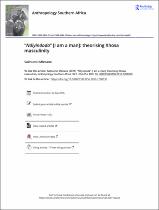“Ndiyindoda” [I am a man]: Theorising Xhosa masculinity
Abstract
Masculinity studies in South Africa depend on Western gender theories to frame research questions and fieldwork. This article argues that such theories offer a limited understanding of Xhosa constructions of masculinity. Xhosa notions of masculinity are embodied in the concept of indoda, meaning a traditionally circumcised person. This article explores the nuanced meanings of indoda and its relationship to other masculinities, like uncircumcised boys [inkwenkwe] and medically circumcised men. The discussion reveals that indoda is the most “honoured” form of masculinity. A traditionally circumcised individual is regarded as indoda, a real man, irrespective of his sexual orientation or class, and this affords him certain rights and privileges. Inkwenkwe and medically circumcised men embody “subordinate” forms of masculinity and are victims of stigma and discrimination by indoda. This requires us to revisit some Western theories of masculinity which place heterosexual men at the top of a masculine hierarchy and gay men at the bottom. It furthermore requires us to pay attention to the body when theorising Xhosa masculinity, since it is a principal way of “proving” and “defending” Xhosa manhood.

